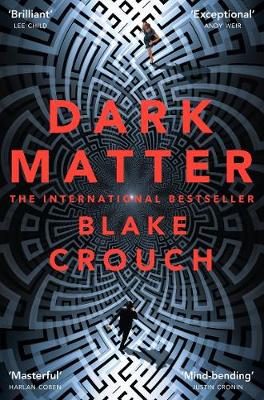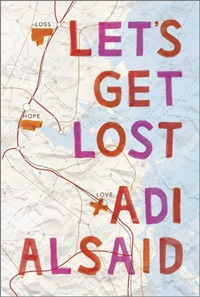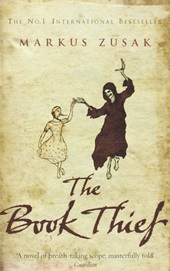Book Review: Blake Crouch – “Dark Matter”
September 7, 2017 Leave a comment

“Are you happy with your life?”
Those are the last words Jason Dessen hears before the masked abductor knocks him unconscious.
Before he awakens to find himself strapped to a gurney, surrounded by strangers in hazmat suits.
Before a man Jason’s never met smiles down at him and says, “Welcome back, my friend.”
In this world he’s woken up to, Jason’s life is not the one he knows. His wife is not his wife. His son was never born. And Jason is not an ordinary college physics professor, but a celebrated genius who has achieved something remarkable. Something impossible.
Is it this world or the other that’s the dream? And even if the home he remembers is real, how can Jason possibly make it back to the family he loves? The answers lie in a journey more wondrous and horrifying than anything he could’ve imagined—one that will force him to confront the darkest parts of himself even as he battles a terrifying, seemingly unbeatable foe. (Source: amazon.com)
It’s been a long time since it felt right to do another book review on here, but this book captured me so much that I feel like I have to, to share my opinion of this exceptional piece of literature with the world.
So…Yes. Yes. Yes. And Yes again.
This book is the one I enjoyed the most from all the books I’ve read recently, and the one I had the most difficulties with putting it down. Plus, it was SO much better than the first book of Blake Crouch’s “Wayward Pines” series (which was the only one of the trilogy I read).
First of all – the main character. Jason Dessen is, despite working in a profession I was a loser in at school – physics – one of the most sympathetic characters I had the pleasure to read about. You’re thrown right into the story from the beginning, and you get to know everthing about Jason and his family that you need to know. I love the banter between him and his wife, and with his old college friend Ryan Holder only hours before things change for him. It’s all described in such a normalcy that it’s easy for the reader to picture every single situation in their own head, because it could be easily you or me finding themselves in that scene. What I especially liked so much about Jason is his integrity; his one and only aim keeps being his wife at all times, no matter what people or problems he’s confronted with, or in what situations he’s being pushed, deliberately or not. Jason’s the kind of person one like me would love to be one day.
All the other characters have their very own charm, too, as I mentioned before, and that’s the only tiny thing that I didn’t like about the book: the fate of one of them, someone a reader like me might come to like at a certain point, is being kept in the open. Maybe it’s exactly what Crouch intended, to have his readers’ minds still alert after finishing the book, wondering what happened to that one character. It certainly left me with that thought, and there’s a part inside of me, that, despite all the satisfaction this book left me with, that would love to know what happens to him/her (no spoilers here!)
Blake Crouch manages to find just the right balance between the technical side of his story, with all the physics stuff, and the suspense he’s building up with every single sentence. The short sentences in general really catch the reader – you read them down, a feeling inside your gut building that something big is going to happen, something scene-changing…and even if it may not, it doesn’t kill any of its overall suspense. If anything, it raises said suspense even more. And although the chapters are quite long, it doesn’t diminish any of the effects they have on the reader; they are enjoyable to the fullest, and reading them, with everything that happens, it seems like it’s just a blink of an eye when you finished another one.
The overall message of the book is amazing, though I am not able to find the right words to explain why.
Just the thought that somewhere in existence, with some “branch” that builds itself with every single decision we make/made in our life, there are hundreds, thousands, millions of other “us” who live in a complete different way, place, circumstance, and that with the right technical knowledge and abilities, these millions of versions of us could clash with each other in some way – it’s as much frightening as interesting as nothing else I ever thought about. It’s such a deceptive way of thinking that anything that Blake Crouch has thought up in his mind can be possible, and at the same time, it just gets more scaring when you think it about in this way: 30 years ago, nobody would have thought about a device like a Smartphone being possible, or artificial intelligence, or robots walking, working, somewhat “living” on their own, and nowadays, we view these things as normal, as “just the way it’s supposed to be”. The fact that the story revolves around the possibility for someone with the right – or wrong – motives to change his own life without changing the timeline of the world, to just simply step into a complete different dimension where one could be more successful, more satisfied, happier – even if it might be at the expense of your loved one’s or friends’ lives, – is strangely intriguing, and leaves the reader with the thought: “What if I had those possibilities? Would I go for it or am I satisfied with the way my “branch” reaches out?” And of course, one other, more important thought:
Will that technology one day be possible in our dimension?
So all in all, “Dark Matter” is one of the most exceptional books I had the honor and pleasure to read during the past year, and knowing that it’s going to be made into a movie in 2018 is just another sign of HOW exceptionally good it is. For people who love books having the theme of “What if…?”, this one is the perfect choice.










